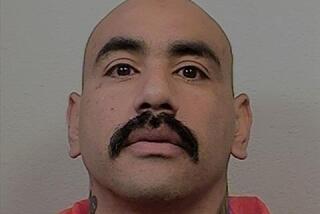Healing Enrile ‘Scars’ : Ramos Faces Philippine Military Rift
- Share via
MANILA — Before dawn broke over Manila on Wednesday morning, Gen. Fidel V. Ramos was out in his jogging shorts, leading the commanding general of the Philippine air force and hundreds of his key pilots and wing commanders on a four-mile run through the nation’s main air base.
Ramos, 59, the armed forces chief of staff, likes to jog with his men. It builds unity and discipline, he says. But on Wednesday, in the wake of Ramos’ preemptive weekend operation that neutralized military support for Defense Minister Juan Ponce Enrile and cleared the way for his firing, the jog around Villamor air base took on added importance.
Enrile Had Wide Support
If it had come down to a military showdown between Ramos and Enrile last Sunday, as Ramos himself feared it might, reliable sources now say much of the air force almost certainly would have sided with Enrile--as would many other key military commanders. And Wednesday’s early-morning jog was symbolic of the task of internal healing now facing Ramos within a 200,000-man Philippine armed forces still reeling from nine months of internal trauma.
Despite the contention by President Corazon Aquino’s aides this week that the alleged military plot to topple her government involved just “a very small, infinitesimal group within the military,” there was in fact large and far-reaching military support for the ousted defense minister, whose elite security force has been blamed for the rumored plot that Ramos said triggered his preemptive strike.
As one military analyst described Ramos’ action, “The general performed a delicate surgical operation to remove Enrile--a friend of both Ramos and the entire military. After any major surgery, it takes time to heal the wounds, and there’s always the threat of complications.”
2 Were Allies in Revolt
Adding to those complications, Ramos’ operation was the second major convulsion in the Philippine military this year. In February, Enrile and Ramos were allies in marshaling dissident forces within the military to rebel against Ferdinand E. Marcos in the Roman Catholic Church-supported coup that drove Marcos from power.
When Aquino took over the government, Enrile has said, he and Ramos controlled 80% of the armed forces, and both men have spent much of the past nine months trying to integrate the remaining 20%, the so-called Marcos loyalist forces, into the mainstream military.
In the weeks leading up to the Saturday night operation, though, senior commanders and enlisted men found themselves forced once again to reassess their loyalties amid waves of rumors that Enrile’s forces were plotting against the government--with or without Ramos’ support.
Ramos, an excellent poker player, never took sides as the rift widened between President Aquino and Enrile, who publicly criticized many of her policies. But most commanders and outside military analysts assumed that Enrile and Ramos were ideological allies--Enrile the loud critic and Ramos the quiet, constructive voice in the president’s ear.
Now, with Enrile out and his internal security force on the run after a military action in which Ramos clearly took a stand against a man he once said was “a partner for all time,” a new set of what Ramos has called “cracks and cleavages” in the military’s “ship of state” must again be mended.
Senior military sources cited that healing process in explaining why the military encouraged Aquino so firmly to sign a temporary cease-fire with the Communist rebels--to give the armed forces a break from 17 years of battle that Ramos and his top commanders can use to reunite the armed forces.
“Any time an institution has gone through the trauma that this one has, there are some wounds that have to be salved,” said one senior Western diplomat in Manila. But the wounds, he added, are primarily “just remedial scar tissue,” and he and other analysts suggested that the military now has a golden opportunity to unify and depoliticize itself for the first time since Marcos declared martial law in 1972.
Ramos, who is again being cast as a national hero this week for his role in excising Enrile and shoring up Aquino’s young government, will not comment on the divisions. He has not spoken in public, and he has announced that he will not grant any interviews for at least two weeks. That policy, too, is part of the general’s post-surgical treatment.
Portrayed as Hero
“Just leave us alone for a while,” the general told one American journalist Tuesday night. “There’s still a lot of work to be done.”
The concern is that the more Ramos is venerated in public, the more embittered Enrile’s military supporters will become, and the deeper the lingering divisions within the military will be.
Already, Ramos, a respected, West Point-trained professional, has become a new target of the dissident groups remaining in the military. On Tuesday, a rumor campaign began suggesting that Ramos would resign his post to become the new minister of public works.
Even before the chief of staff launched his preemptive strike against Enrile’s men Saturday night--sealing off all major radio, television and broadcast stations nationwide and ordering regional commanders to ignore all directives from Enrile’s Defense Ministry--members of Enrile’s security force were sniping privately at Ramos. They chided him as a “peacetime general” who was being emasculated by Aquino and driven away from his troops and into politics.
On Tuesday, Ramos launched a public relations campaign of his own within the military.
“It shall be the policy of the government to keep the armed forces free from political influences,” he declared before more than 100 commanders Tuesday night in an effort to blunt the political fallout in the military.
The chief of staff was quoting from a section in Aquino’s proposed national constitution that will be put to a national referendum in February. The occasion was a three-hour seminar Ramos had arranged in the officers’ club at military headquarters to explain the 109-page charter to top commanders.
At one point during the meeting, though, Ramos was forced to respond to the open adulation of his many military supporters for his performance over the weekend.
“If there is a day in the history of the Philippines that should be revered forever, it is last Saturday,” exulted retired Gen. Crispin de Castro, one of 48 commissioners Aquino appointed to draft the constitution.
Declaring that a monument to Ramos should be erected in the military camp to commemorate his swift, bold action, De Castro said, “It was on that day when we in the armed forces separated the men from the boys, and the chaff from the grain.”
Ramos bristled. Apparently far more concerned with the reaction among Enrile’s principal supporters, who have often been called “the boys,” Ramos immediately declared that “every man and woman in the armed forces is to be congratulated” for the outcome of the operation.
Not a single shot was fired, he said. Rather than ordering a retaliation, Enrile had accepted Aquino’s decision with grace and dignity and ordered his followers to obey Ramos and his commanders, a response that, in the words of one top Defense Ministry official, “probably averted a civil war.”
Ramos had obviously shared that concern. “Our biggest fear last Saturday night,” he said, “was that if there was a big break or polarization in the armed forces . . . this might give the wrong signal to all the armed groups out there.
“We could have been fighting on three fronts,” Ramos said, referring to the Communist guerrillas, the Muslim secessionists in Mindanao and pro-Enrile factions within the military. Ramos added that he also feared that common criminals “would take advantage of the anarchy to rob banks, supermarkets and everything else. . . .
“There was even one very probable scenario: We were very afraid that, with all of this confusion, the soldiers and the policemen would just go home and take care of their families, leaving the population unprotected.”
Depth of Split Uncertain
No one--perhaps not even Ramos--is certain just how deep the lingering wounds run. Foreign journalists who accompanied Enrile on a trip last month to the key southern cities of Cebu and Zamboanga, both of which house large air force bases and sizable combat battalions, witnessed top unit commanders giving Enrile their personal commitments of loyalty.
One Western military analyst in Manila who asked not to be named estimated that at least 70% of the troops on Mindanao would have fought for Enrile and that he would have controlled most of the major airports and key military installations south of the island of Luzon, where Manila is located.
The army and air force commanders, though, make up just a part of the military organization. The largest service is the Philippine Constabulary, which owes virtually unanimous loyalty to Ramos, who headed the constabulary for many years and remains its spiritual leader.
Now, Ramos’ goal is to reunite all those forces into a unified military. “One of the biggest problems in the last nine months is that the military has been so involved with itself that it had no time to concentrate on its real needs--training, discipline, re-equipping its soldiers,” the senior diplomat said.
“I would hope that now they will be able to do that.”
Other encouraging signs in the military are the good relationship between Ramos and Enrile’s replacement, Defense Minister Rafael Ileto, and what the diplomatic analyst called “the political exhaustion level” now dominant in the military after the past several weeks of crisis.
“You now have a chief of staff and a defense minister who are both genuinely dedicated to the ideal of a military free from politics,” he said. “Before, you had a defense minister who was intent on keeping the military politicized.”
More to Read
Sign up for Essential California
The most important California stories and recommendations in your inbox every morning.
You may occasionally receive promotional content from the Los Angeles Times.










